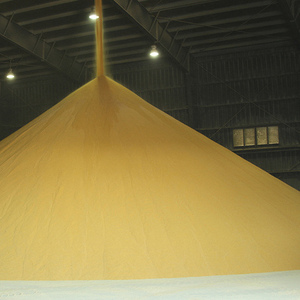Evonik launches fast, reliable test for DDGS quality

March 22, 2019
BY Evonik
Evonik has launched a new fast and easy-to-use analytical service to test distillers dried grains with solubles (DDGS). Up to now, the industry has lacked reliable tests to judge the quality of corn DDGS during the process of raw material reception. Evonik’s new AMINORED 2.0 has been developed to close that gap and is unparalleled in the market.
The new AMINORED 2.0 test allows users to rapidly and reliably evaluate the nutritional value of corn DDGS used in feed production, detecting the impact of processing. Crucially, it distinguishes over-processed batches and reveals the degree of over-processing; a major concern in corn DDGS.
Without the test, nutritionists usually apply high safety margins to corn DDGS and use low digestibility coefficients, to minimize risk as quality is variable both between different plants and even within plants. Up to 20 percentage points difference had been reported in digestibility levels. For example, digestibility of lysine (Lys) in pigs ranged from 44 per cent to 63 per cent.
Advertisement
Advertisement
“With insufficient global supplies, and higher prices of standard raw materials for animal feed, there is a trend towards increased use of alternative ingredients. Deeper understanding of DDGS and a precise evaluation of its quality allows a more accurate feed formulation and thus a more consistent livestock performance over time,” says Ingolf Reimann, head of analytical services, Animal Nutrition.
“Over-processing has a negative impact on the nutritional value of DDGS as the amino acids are destroyed and amino acid digestibility is lowered. If this is not considered in feed formulation, then animal performance and producer profit levels will suffer,” he says.
AMINORED 2.0 allows separate calibrations for ground and unground material. This includes calibrations for unground material when immediate results are requested, for example for incoming material on a weigh-bridge. When producers require a more precise analysis, such as for feed formulation, calibrations for ground material can be chosen.
Advertisement
Advertisement
The new calibrations are up-to-date regarding sample quality and variability on global basis. Their accuracy has been proved by validations with independent samples.
DDGS are the nutrient rich co-product of dry-milled ethanol production and are used as a feed ingredient to provide supplementary energy and protein.
Related Stories
Neste Corp. on July 24 released second quarter results, reporting record quarterly renewable product sales volumes despite weaker margins. SAF sales were up nearly 80% when compared to the first quarter of 2025.
Valero Energy Corp. on July 24 released second quarter results, reporting a profitable three-month period for its ethanol segment. The renewable diesel segment posted a loss, but the company’s new sustainable aviation fuel (SAF) unit operated well.
The IRS on July 21 published a notice announcing the 2025 calendar-year inflation adjustment factor for the Section 45Z clen fuel production credit. The resulting adjustment boosts maximum the value of the credit by approximately 6%.
U.S. Secretary of Agriculture Brooke L. Rollins today announced the reorganization of the USDA, refocusing its core operations to better align with its founding mission of supporting American farming, ranching, and forestry.
The U.S. Department of Energy’s Office of Energy Efficiency and Renewable Energy is soliciting public comments on a preliminary plan for determining provisional emissions rates (PER) for the purposes of the 45Z clean fuel production credit.
Upcoming Events










